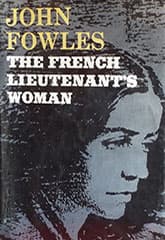The French Lieutenant's Woman
CRITIQUE | THE TEXT | AT THE MOVIES
 First edition
First editionFirst publication
1969
Literary form
Novel
Genre
Literary, historical fiction, postmodern
Writing language
English
Author's country
England
Length
Approx. 148,500 words
Notable lines
An easterly is the most disagreeable wind in Lyme Bay—Lyme Bay being that largest bite from the underside of England's outstretched southwestern leg—and a person of curiosity could at once have deduced several strong probabilities about the pair who began to walk down the quay at Lyme Regis, the small but ancient eponym of the inbite, one incisively sharp and blustery morning in the late March of 1867.
— First lines
We all write poems; it is simply that poets are the ones who write in words.
...so are we all novelists, that is, we have a habit of writing fictional futures for ourselves, although perhaps today we incline more to put ourselves into a film. We screen in our minds hypotheses about how we might behave, about what might happen to us; and these novelistic or cinematic hypotheses often have very much more effect on how we actually do behave, when the real future becomes the present, than we generally allow.
Death is not in the nature of things; it is the nature of things.
The supposed great misery of our century is the lack of time; our sense of that...is why we devote such a huge proportion of the ingenuity and income of our societies to finding faster ways of doing things—as if the final aim of mankind was to grow closer not to a perfect humanity, but to a perfect lightning-flash.
They looked down on her; and she looked up through them.
Life is not a symbol, is not one riddle and one failure to guess it, is not to inhabit one face alone or to be given up after one losing throw of the dice; but is to be, however inadequately, emptily, hopelessly into the city's iron heart, endured. And out again, upon the unplumb'd, salt, estranging sea.
— Last line
CRITIQUE |THE TEXT | AT THE MOVIES



